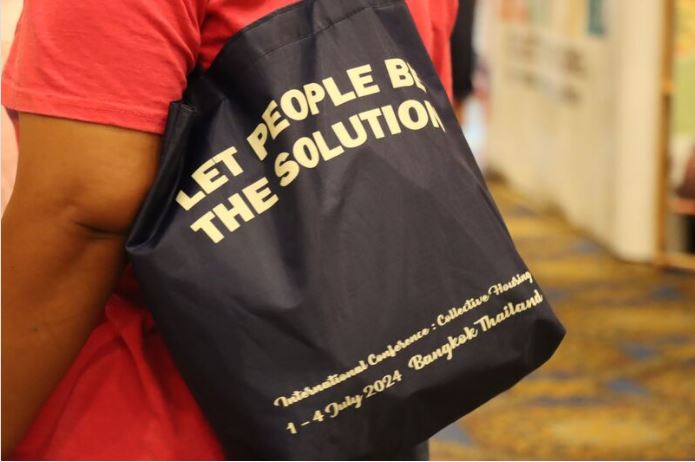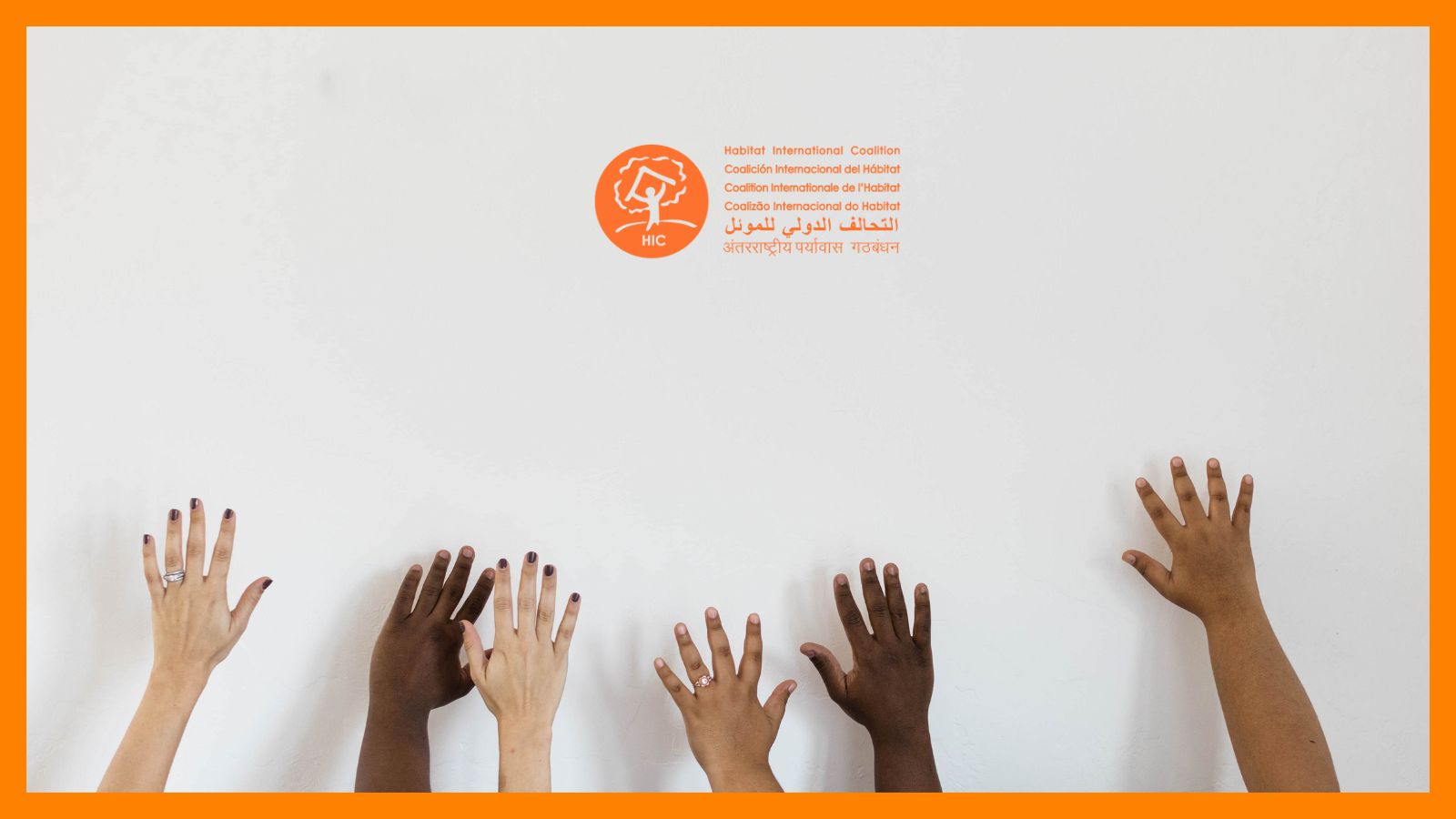HIC will join the SDG Summit 2023 that will be celebrated in New York
HIC Members and Allies will be in New York to actively participate in the SDG Summit ( 18 to 19 September 2023), to call on Member States and UN agencies to commit to concrete actions guided by a human rights-based approach and through the inclusion of civil society and local government actors and to engage with locally -led initiatives such as the social and solidarity economy, the right to the city, the social production of habitat and the collective defense and protection of commons.
About:
The High-Level Political Forum (HLPF) meets every year in July under the auspices of the Economic and Social Council, bringing high-level representatives of governments and stakeholders together to review progress, examine obstacles, exchange best practices, and recommend new actions to achieve the 2030 Agenda and the SDGs. Countries agreed that every four years, the HLPF will meet under the auspices of the General Assembly at the level of Heads of State and Government. (General Assembly resolutions 67/290 and 70/299)
The SDG Summit in September 2023 will be the second time for the HLPF to be convened under the auspices of the General Assembly at the level of Heads of State and Government. It will be chaired by the President of the General Assembly. The outcome of the Summit will be a negotiated political declaration.
Collective Declaration for the United Nations SDGs Summit : Unlocking people’s power to achieve the Sustainable Development Goals and the New Urban Agenda
New York City, September 2023
The above subscribed organizations agree on the importance of the 2030 Agenda and the need to accelerate multi-stakeholder-led action for their effective implementation. However, as Member States and United Nations Agencies gather for the 2023 SDGs Summit, we urge them to commit to concrete actions guided by a human rights-based approach and through the inclusion of civil society and local government actors. We demand active engagement and sustained support to community-led and municipal initiatives such as the social production of habitat, the right to the city, the social and solidarity economy, the transition to a cleaner and just energetic and economic model, the care agenda and the collective protection of the natural, social and cultural commons.
The Summit’s declaration reflects consensus on the importance of delivering substantive transformations that respond to current challenges through leveraging the 2030 Agenda Commitments. Nevertheless, the declaration’s overall discourse and lines of action do not represent a significant change from what already exists. It emulates reductionist, misleading and insufficient approaches, particularly in relation to economic development as infinite growth and political decision making that prioritizes the national level.
With a variety of stakeholders engaging during the Summit and its preceding activities, the above position is shared by diverse constituencies. The Statement of the Global Taskforce of Local and Regional Governments to the Summit, for example, points to the need to “go beyond incremental changes to transform our societies and achieve the 2030 Agenda”, while the key messages of the Women’s Major Group for 2023 High Level Political Forum, held in July, calls for immediate action for the full implementation of the SDGs, based on policy coherence and strong accountability mechanisms, building on a “body of rights-based guidance that we too rarely see incorporated into the High-Level Political Forum (HLPF) proceedings or implementation at the national level”. Such a call is also echoed in the joint declaration of Special Rapporteurs, Independent Experts, and Chairpersons of the Working Groups of the Special Procedures of the Human Rights Council.
SDGs are not implemented through a Human Rights perspective and, while understood as complementary to other more comprehensive frameworks such as the New Urban Agenda (NUA), are not integrated to those. While the acknowledgement of the NUA in the draft final declaration is welcomed, it does not include some of key NUA principles such as fulfillment of the social and ecological functions of land and human settlements, the support to the social and solidarity economy, the democratic management of cities and territories, and the right to the city.
Moreover, the declaration mentions “localization” but does not address crucial territorial dynamics. By doing so, an opportunity is lost to engage in a meaningful discussion on the root causes of the most pressing challenges in cities and human settlements. These are linked to models of urban growth and economic development that are based on the maximization of profits, the exploitation of nature and the environment, and the increasing centralization of power and decision-making. It is clear that no true transformative actions can be achieved without changing the current economic and political dynamics .
Member States and UN agencies urgently need to engage with transformative, locally-led approaches such as the social and solidarity economy, the caregiving leaderships of grassroots women, the right to the city, the social production of habitat, the just transition and the collective defense and protection of commons. These approaches introduce new forms of social, political and economic organization that are centered on the collective interest, and place people and planet at the center. They also introduce opportunities for advancing towards more democratic societies through social innovation practices that seek to introduce more horizontal, collaborative and collective decision-making frameworks. The declaration mentions “participation” and “partnerships” but without recognizing the efforts led by actors on the ground, in particular by community-led groups, civil society and local governments, nor providing concrete and adequate frameworks to support these initiatives and in many cases in fact undermining them. This contributes to a scenario of invisibilization of relevant contributions towards SDGs by local actors and communities, who lack sustained support from national governments and multilateral institutions, which at the same time also refrain from their responsibilities of regulating large corporate actors.
Coupled with the very concerning limitations of non-State actor participation during the Summit, the declaration does not instill confidence that its outcomes will indeed contribute to delivering the transformations needed, nor that it will inform a wider and much needed discussion on pluralizing and democratizing the UN governance system and the financial architecture that should enable delivering on commitments. As discussions gear up towards the 2024 Summit for the Future, it is clear that without substantially widening the channels of dialogue and collaboration with other stakeholders and effectively supporting community-led processes and the role of women’s leadership in decision-making, we will remain on the path of inertia and considerable retrogression. Particularly in a context of multiple, acute and interconnected crises, including the attack on and weakening of democratic institutions and mechanisms, and criminalization of human rights activists and social movements, the UN is missing an opportunity to make the necessary adaptations to ensure transformative and accelerated implementation of the SDGs agenda and its commitments.
Thus, ahead of the 2023 SDGs Summit, we collectively call for commitments that are engaged with the implementation of the 2030 Agenda as to achieve substantial transformation towards more just, sustainable and diverse human settlements, based on the collective wellbeing and the protection of people and the planet. For such, both discourse and practice have to be drastically altered under a firm commitment and engagement towards substantive alternatives to the current economic and political decision-making systems in place. This starts with effective recognition and inclusion of civil society and local government actors in the discussion as well as direct support to the transformative initiatives being led by them.
Key dates of the SDG Summit:
- March to end fossil fuels – 17 September – 13h (MGOS will join at 15h)
- Summit – 18th and 19th September
- SDG Action weekend – 16-17 September
- NYC Climate week – 17-24 September
- Global People’s Assembly – 17-18 September
- Tue 19th – Possible March by MGOs
- Climate Ambition Summit (UN) – 20 September
More information and further documents, such as the resolutions presented by States can be found at the Official SDG Summit website.


